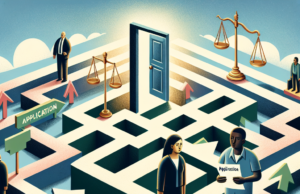
The immigration reform bill that has been put forth by the bipartisan Gang of Eight senators is now being marked up by the Senate Judiciary Committee. The Senate Judiciary Committee has proposed a total of 300 amendments to the 844 page bill. These amendments are varied, ranging from protections to same-sex couples to efforts to further increase border security. The ultimate goal of some of the amendments is to do away with the provisions in the legislation that would create a path to citizenship for the 11 million undocumented immigrants. However, most observers have stated that it is highly unlikely for the basic makeup of the bill to change, as its bipartisan supporters of this legislation are likely to stick together to stop any major changes.
(More on News at LAWS.com, contact Adam for interviews “adama@laws.com”)
The Republican side has proposed the majority of the amendments – 194 of the 300 total – and most of these aims to further secure the border. Republican Sen. John Cornyn of Texas, for example, has introduced a lengthy plan, 70 pages in total, to strengthen border security and make it much more challenging for undocumented immigrants to get on the path to citizenship. Other amendments proposed by Democrats, such as the amendment proposed by Democratic Sen. Patrick Leahy of Vermont that would make foreign born same-sex partners of American citizens eligible to apply for a green card, are also controversial.
The original legislation that was introduced by the Gang of Eight aims to expand legal immigration over the next decade, increase border security, and provide a path to citizenship to the 11 million undocumented immigrants in the country. This last provision in particular has naturally gained the support of many social justice and civil rights organizations, although some have voiced strong opposition to the length of time undocumented immigrants must wait before applying for citizenship, which is proposed to be 13 years.
The Equal Rights Center (ERC) is a non-profit civil rights organization that promotes equal opportunity in employment, housing, access to public accommodations and government services through research, testing, education, advocacy and enforcement. The ERC works with a diverse group of different populations, and undertakes many activities pertaining to immigrant rights.
The following is an interview laws.com conducted with the ERC on their stance on the current immigration reform being debated in the Senate as well as their work in the realm of civil rights in general.
What is is your opinion on the immigration-reform bill being debated in the Senate?
The Equal Rights Center is not directly involved in policy advocacy with respect to the immigration reform debate going on in Congress. That being said, as the immigration reform debate has drawn out over time, and has become more vitriolic, it has engendered an atmosphere in many communities that fosters discrimination not just against undocumented individuals, but against any person who might fit someone’s stereotype of what an undocumented individual “might look like.” The results of this atmosphere are an increase in crimes targeting Latinos, alienation and isolation of immigrant communities, and pervasive discrimination that has been documented through civil rights testing. As the Equal Rights Center works to advance equal opportunity for all, we look forward to the implementation of comprehensive immigration reform by our leaders as a necessary step in eliminating discrimination based on national origin.
Overall, the movement and recognition that a consensus needs to be attained is encouraging. We seemingly have finally reached a point where both major political parties recognize that immigration is an issue that is in the minds and hearts of Americans, regardless of politics. When we discuss immigration reform we are talking about real families who face the threat of being torn apart every day. Working to address the framework that creates these situations will create a better environment for all individuals who want the opportunity to work in our nation and create a fair path to legal status for those who are already here and contribute to diverse and rich communities across the nation.
Many details remain to be ironed out, but overall we are very encouraged and look forward to working with immigrant communities and other advocates to create more support.
What are some of the key changes you would like to see happen to U.S. immigration policy?
Federal immigration legislation sets the standard for state and local legislation regarding immigrant communities. The Equal Rights Center works to ensure that immigrant communities are granted equal opportunity and equal access in housing, employment, public accommodations and government services. We hope that any legislation will reflect this access to equal opportunity and further prohibit discriminatory practices aimed toward immigrant communities.
Some organizations argue that undocumented immigrants should not be given amnesty because entering the country illegally is not a victimless crime. What is your response to this idea?
Immigrant communities contribute to diversity in all facets of American society. The current 11 million undocumented immigrants in this country also constitute a vital part of the American economy. An even greater drain on public funds is the current immigration system. A report released by the non-partisan, Washington-based Migration Policy Institute reveals that, in 2012, the U.S. government spent more money on federal immigration enforcement than any other federal enforcement activities. And the numbers aren’t even close. According to the report, the federal government spent $18 billion on immigration enforcement in 2012, 24 percent more that than it spent for the FBI, the DEA, the Secret Service, the U.S. Marshals Service, and the ATF combined. Investment in a system that eliminates this tremendous spending and encourages diversity in the American labor force would be a benefit to all Americans.
And specifically regarding children and youth, it is encouraging to see that Congress is considering creating an easier path to citizenship for children brought into this country by parents.
What are some of the accomplishments of the Equal Rights Center in the realm of immigration reform?
We continue to vigilantly monitor the debate on immigration reform and its ripple effect on local legislation, as they both have direct impact not only on the communities comprised of our newest Americans, but on the larger struggle to ensure equal opportunity for all.
Recognizing that “English only” rules and similar barriers for people with limited English proficiency (LEP) often serve as proxies for national origin discrimination – and that LEP immigrants may be unaware of their rights and how to seek redress when they experience discrimination –the ERC also gives special attention to LEP communities and in the past year the ERC had connected with tens of thousands of immigrants to help ensure they are aware of their rights.
What does the Equal Rights Center have planned for the future?
The Equal Rights Center will continue its initiatives focused on highlighting and combating discrimination based on national origin, as we have for the past 30 years. This will include targeted education and outreach to immigrant communities, and civil rights testing and reporting as is illustrated in our most recent report entitled Precaution: Obstacles for Latinos in the Virginia Rental Housing Market. Finally, we will continue to advocate for immigrant individuals and communities as immigration policy is put into practice.
For more information on the Equal Rights Center, please visit their site. For more information on immigration laws and news, please visit our Immigration Laws Page.
The Equal Rights Center on the Civil Rights of Immigrants
The Equal Rights Center (ERC) is a national non-profit organization that focuses on advancing equal opportunities for all people, regardless of their race, ethnicity, religion, gender, sexual orientation, or national origin. The organization is dedicated to fighting against discrimination, housing segregation, and unequal treatment. In this article, we will focus on the ERC’s work on the civil rights of immigrants in the United States.
Introduction
Immigrants have been a part of the United States’ history since its inception. However, for many years, immigrants have been the targets of discrimination, hate crimes, and unequal treatment. Immigrants have been subjected to employment discrimination, housing segregation, and racial profiling, among other forms of discrimination. In response to these injustices, the ERC has been working to promote civil rights for immigrants in the country by seeking policy changes, advocacy efforts, and litigation.
The ERC’s Policy Focus
The ERC’s policy focus has been to promote civil rights for immigrants by creating a more comprehensive and inclusive approach to policy development, implementation, and enforcement. The ERC’s approach includes working with community-based groups, immigrant rights organizations, and policymakers to move forward legislative and policy changes that promote immigrants’ rights and promote their full integration into society.
Legislation
The ERC has been instrumental in advocating for comprehensive immigration reform, which would address the many pressing issues facing immigrants in the United States. The ERC has supported the passage of the DREAM Act, which would provide a path to citizenship for young immigrants who were brought to the United States as children and who meet certain eligibility requirements.
The ERC has also advocated for the passage of the Comprehensive Immigration Reform (CIR) legislation, which would provide a path to citizenship for undocumented immigrants who have resided in the United States for a certain period and who meet specific eligibility requirements. The CIR legislation would also improve the current immigration system, legal requirements, and the treatment of immigrants in the country.
Advocacy
The ERC’s advocacy work has focused on informing lawmakers, policymakers, and community members of the challenges facing immigrants and advocating for policies that promote immigrant rights. The ERC has used data to illustrate discrimination and inequality in the immigration system and other areas of society.
The ERC has also collaborated with other organizations to organize policy roundtables, conduct research, and publish reports on the issues affecting immigrants. The ERC has worked to educate the public about the importance of immigrant rights and to mobilize these communities in support of policy changes.
Litigation
The ERC has taken on legal challenges that seek to promote the civil rights of immigrants. The ERC has filed lawsuits against businesses that engage in discriminatory practices, including the denial of employment and access to housing. The ERC has also filed complaints against landlords who violate fair housing laws by discriminating against tenants based on their national origin.
In 2020, the ERC filed a lawsuit against the U.S. Citizenship and Immigration Services (USCIS) for violating the Freedom of Information Act. This lawsuit was filed after the USCIS refused to provide information related to its decision to terminate a program that provided temporary protected status to immigrants from certain countries.
In addition to lawsuits, the ERC has supported immigrants in other ways, such as providing legal information and representation. The ERC has collaborated with other organizations to offer legal assistance to immigrants and provide them with access to other resources.
Challenges Faced by Immigrants
Immigrants in the United States face numerous challenges and obstacles, both in their daily lives and as they attempt to navigate the immigration system. Some of the issues faced by immigrants include:
– Employment discrimination, including the denial of jobs, low wages, and poor working conditions.
– Housing discrimination, including being denied access to housing, poor housing conditions, and racial segregation.
– Language barriers, which often prevent immigrants from accessing crucial services and information.
– Access to healthcare, as many immigrants lack access to affordable healthcare due to their immigration status.
– Discrimination based on race, ethnicity, religion, or national origin, which can result in hate crimes, harassment, and other forms of violence.
The COVID-19 pandemic has disproportionately affected immigrants, particularly those who are undocumented. Due to their status, many immigrants are not eligible for government assistance, such as stimulus checks and unemployment benefits. As a result, many have lost their jobs, and they face increased economic instability and insecurity.
Conclusion
The ERC has been instrumental in advocating for the civil rights of immigrants in the United States. It has promoted policy changes, advocacy efforts, and litigation aimed at creating a more inclusive society that promotes the rights of all individuals, including immigrants. The ERC has highlighted the many challenges and obstacles faced by immigrants and has worked to address these issues through collaboration with community-based groups, immigrant rights organizations, and policymakers. While much work remains to be done, the ERC’s efforts have been a crucial step in promoting equality and opportunity for everyone in the United States.
– Housing discrimination, including being denied access to housing, poor housing conditions, and racial segregation.
– Language barriers, which often prevent immigrants from accessing crucial services and information.
– Access to healthcare, as many immigrants lack access to affordable healthcare due to their immigration status.
– Discrimination based on race, ethnicity, religion, or national origin, which can result in hate crimes, harassment, and other forms of violence.

























